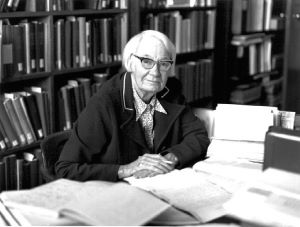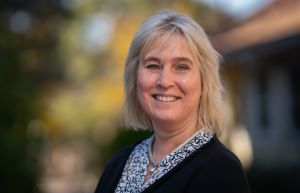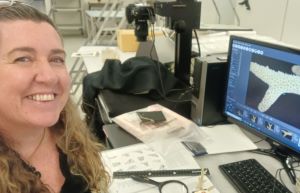This event will focus on the work of Professor Dorothy Hill AC CBE FAA FRS, who was the first woman elected to the Australian Academy of Science.
The speakers will explore the significant work of Professor Hill who was a pioneering figure in the field of geology, particularly in the study of coral reefs and the stratigraphy of the Great Barrier Reef. Her contributions were significant not only for their scientific merit but also for breaking barriers for women in academia.

Dorothy Hill made a broad contribution to science in Australia at a time when both university and government science were in need of considerable improvement, and the benefits of research were not widely appreciated among university administrators.
She discovered the use of fossil corals in sorting out the correlations of Palaeozoic rocks in Australia, took advantage of the vicinity of the Great Barrier Reef for research, expanded the knowledge of stratigraphy of eastern Australia, and used this newly available information for a revitalised interpretation of continental geology. In doing this she gave great support to field workers and students in their studies, and to the exploration companies working on the coal, oil and economic sedimentary rocks of Queensland. Finally, she set standards for the preparation of large volumes such as those in the Treatise on Invertebrate Paleontology, which were her major contributions to the study of corals.
She was known as an active sports person, a strong leader in academe, a powerful supporter of women’s educational rights, a keeper of intellectual truth as she saw it, a maintainer of academic merit, and a member of Australia’s armed forces. She took part in the education of a large number of students who supported her efforts to advance geology.

Dorrit Jacob is the Director of the Research School of Earth Sciences at the Australian National University. She studied mineralogy and geology at Johannes Gutenberg University in Mainz, Germany after obtaining a degree as chemical laboratory technician ad Fresenius University of Applied Sciences. She received her PhD from Georg-August University in Goettingen, Germany for her thesis on petrology and geochemistry of diamond-bearing eclogites from Earth’s mantle beneath Siberia. During her postdoctoral years in Germany and the US, she became intrigued by how organisms form minerals and expanded her research focus towards biomineralisation. She was awarded a permanent German Science Foundation Heisenberg Chair in Biomineralisation in 2012 at the University of Mainz in Germany. In 2013 Professor Jacob emigrated to Australia with her family to accept an ARC Future Fellowship at Macquarie University, and headed the Department of Earth and Planetary Sciences there in 2019–20. She has been in her current role at the ANU since 2020. Professor Jacob was elected a Fellow of the Australian Academy of Science in 2021.

Zoe Richards is the Curator of Marine Invertebrate Zoology at the Western Australia Museum and the leader of a Coral Conservation and Research Group (CORE) within the Trace and Environmental DNA Laboratory at Curtin University. With over two decades of experience spanning the fields of taxonomy, molecular systematics, population genetics, ecology and conservation biology, she applies a unique combination of field experience and quantitative data collection techniques with classical taxonomic training and genetics. By studying and facilitating taxonomic research on marine invertebrate biodiversity, her research unveils the intricate web of marine life and underpins effective monitoring and conservation decision-making. She is a Churchill Fellow and a member of the IUCN Coral Specialist Group. Associate Professor Richards takes pride in collaborating with Aboriginal and Torres Strait Islander communities, notably in the Kimberley region, where she has forged opportunities for meaningful engagement, capacity building and research partnerships.
Date: Tuesday 11 June 2024
Time: 5.30pm–6.00pm at the venue for refreshments, followed by the talks 6.00pm–7.00pm AEST
Venue: The Shine Dome Canberra, and online livestream
Cost: $17 to attend in person, free online
Conversations with Australian Scientists
Australian Academy of Science Biographical Memoir
The Australian Academy of Science’s public speaker series in 2024, our 70th anniversary year, will look at our history and into our future.
In each instalment, we will follow the story of one scientific discipline, with an Academy Fellow and an early-career researcher as our expert guides.
Across geology, virology, astronomy and more, we will trace our science history from landmark discoveries to the present cutting edge of Australian science.
Along the way, we will get to know the Academy’s iconic earliest Fellows who shaped Australian science: from Mark Oliphant to Frank Fenner to Dorothy Hill. We will experience the challenges and curly conundrums they grappled with, celebrate their triumphs and breakthroughs, and look ahead to today’s emerging generation of top minds following in their footsteps.
More information about the whole series is available on the series webpage. Tickets to individual events are available for $17 (in person) or free (online).
events@science.org.au
events@science.org.au
© 2025 Australian Academy of Science